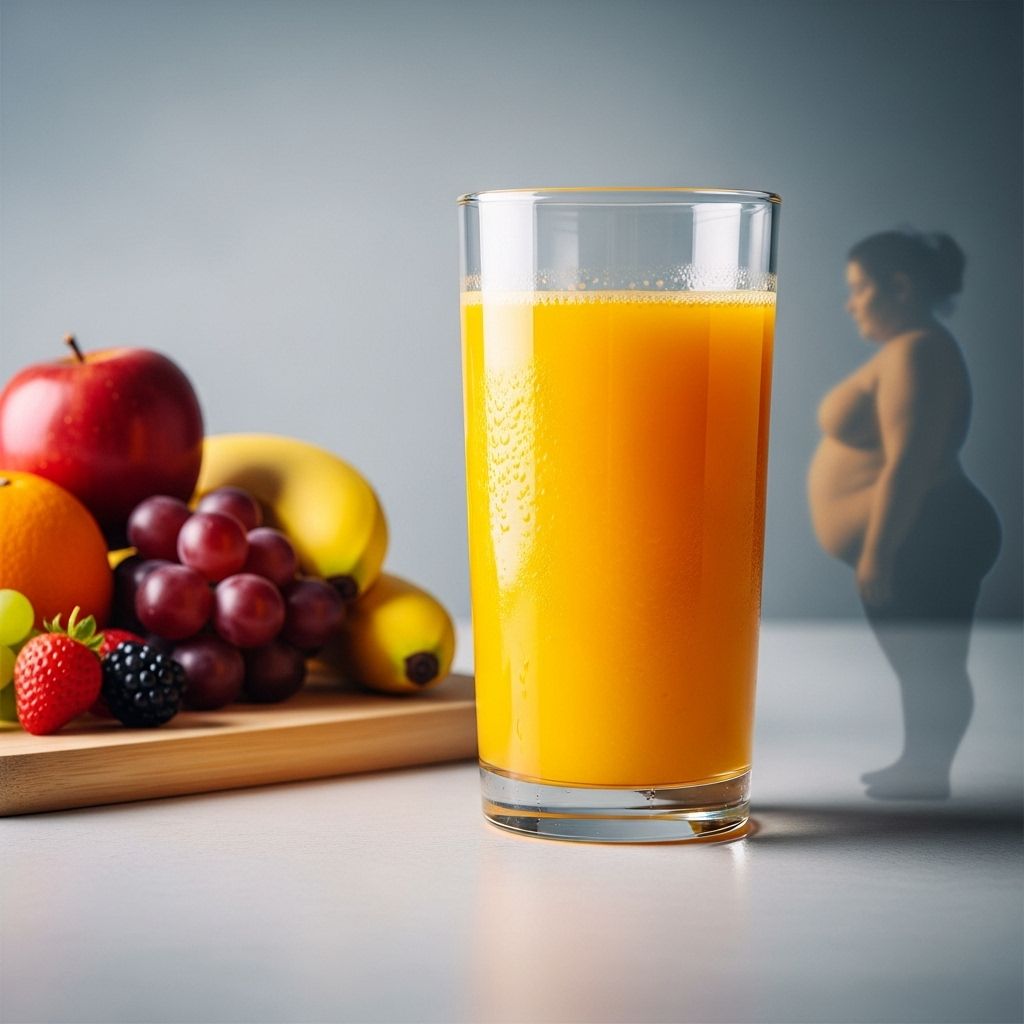Fruit Juice and Weight Gain: New Study Reveals Impact on Children and Adults
Recent research shows even 100% fruit juice may contribute to weight gain, prompting experts to recommend moderation for children and adults.

Fruit Juice and Weight Gain: What Recent Science Tells Us
For decades, fruit juice has enjoyed a reputation as a healthy companion to breakfast tables and school lunches. Its image as a natural source of vitamins and antioxidants has made it a staple in many households. However, emerging research now suggests that even 100% fruit juice—juice made only from fruit, with no added sugar—may play a significant role in weight gain, especially among children and adults. A new systematic review and meta-analysis synthesizing findings from dozens of studies urges the public to take a closer look at this popular beverage and its impact on health.
Key Highlights of the Study
- 100% fruit juice is linked to small but significant weight gain in both children and adults.
- Each daily serving increases BMI (Body Mass Index) in children; the effect is more pronounced in younger children.
- The association for adults is more variable, often depending on total caloric intake and study design.
- Experts recommend moderating fruit juice consumption to avoid excess calorie intake.
Analyzing the New Research: Methods and Findings
This leading-edge research involved a systematic review and meta-analysis of 42 studies, including 17 studies on children and 25 studies on adults. Of the adult studies, 19 were randomized controlled trials (RCTs) and 6 were prospective cohort studies. For children, all were cohort studies, following large groups over time to examine the relationship between fruit juice intake and weight outcomes.
What is 100% Fruit Juice?
- Defined as fruit juice with no added sugar.
- Includes juices like orange, apple, grape, berry, pomegranate, tart cherry, and citrus, as evaluated in the studies.
How the Study Was Conducted
Researchers compared participants’ consumption of fruit juice with changes in their body weight, BMI, or BMI z-score. They assessed results based on different age groups and types of study design, offering a robust look at how juice intake may impact health across populations.
The Core Finding: Small but Significant Weight Gain
The major takeaway is clear—each additional 8-ounce serving of 100% fruit juice per day was linked to a measurable increase in BMI for children, and a potential rise in body weight for adults, particularly those who did not adjust overall calorie intake.
| Population | Effect of 1 Daily Serving | Study Type |
|---|---|---|
| Children | +0.03 increase in BMI | Prospective cohort |
| Adults | +0.21 kg weight gain (if not adjusted for calories); -0.08 kg if adjusted | Prospective cohort |
| Adults | No significant impact (wide confidence interval) | RCTs |
Importantly, the increases were modest. For children, a 0.03 BMI rise per daily serving may not seem drastic, but over time and with frequent consumption, the cumulative impact can be meaningful, particularly for younger children under age 11, who showed greater BMI changes.
Why Does Fruit Juice Contribute to Weight Gain?
Despite its wholesome image, fruit juice is high in natural sugar and calories. Unlike whole fruit, juice lacks fiber, which means it does not create the same feeling of fullness. When children or adults drink fruit juice, they may consume more calories than they realize—calories that may not be offset by reductions elsewhere in the diet.
- Liquid calories do not trigger satiety cues as solid foods do, leading to higher overall calorie consumption.
- 100% fruit juice is easy to drink in large quantities, and its sweetness appeals to many.
- Lack of fiber in juice reduces its ability to fill you up, compared to eating whole fruit.
Public health experts worry that frequent juice intake, especially for children who may drink it multiple times daily, can drive subtle but persistent weight gain over months and years.
Expert Perspectives: What Doctors and Dietitians Say
According to the study’s lead author, Michelle Nguyen, PhD Candidate at the Department of Nutritional Sciences Faculty of Medicine at the University of Toronto, using both cohort studies and RCTs was “critical to evaluate the totality of evidence” regarding fruit juice’s link to weight outcomes.
- Health experts increasingly suggest that water is the best beverage choice for children and adults.
- If juice is desired, dilute it with water or seltzer to reduce sugar and calorie intake.
- Fruit juice, even without added sugar, is not equivalent to whole fruit in terms of health impact.
Guidelines from Major Health Organizations
- The American Academy of Pediatrics recommends limiting fruit juice to 4–6 ounces per day for children aged 1–6, and 8 ounces for those aged 7–18.
- Whole fruit is preferred for delivering vitamins, minerals, and fiber.
Comparing Juice Types: Are All Juices Equal?
Not all juices have the same effect on weight. The meta-analysis found certain “superfood” juices, such as pomegranate, berry (goji, barberry, bilberry, currant), and tart cherry, tend to be associated with weight loss or smaller weight gain compared to apple, citrus, and grape juices, which trended toward more weight gain.
Possible Explanation
- Superfood juices may have higher levels of vitamins, antioxidants, and polyphenols, which could confer health benefits at moderate dosages.
- Apple, citrus, and grape juices are often consumed in greater quantities and are sweeter, leading to higher calorie intake.
Implications for Families: Should You Avoid Juice?
The new evidence does not necessarily mean fruit juice must be eliminated entirely. Instead, the consensus is to limit juice intake to moderate levels, consume whole fruits, and be thoughtful about beverage choices.
Healthy Beverage Swaps
- Water is the gold standard for hydration.
- For flavor, infuse water with citrus or berries instead of juice.
- Milk or plant-based milk (unsweetened) can be good choices, especially for children.
If you do choose juice, try diluting it with water or seltzer to reduce the calorie and sugar content per serving.
What About Juice for Adults?
Among adults, the link between 100% fruit juice and weight gain was found in cohort studies that did not adjust for total calorie intake—indicating that excess calories in juice may be the culprit. Studies that did control for overall dietary intake found a negligible association or even a slight inverse relationship. Randomized controlled trials did not show a significant impact, though most were short in duration and had small sample sizes, limiting their power to detect long-term effects.
Key Takeaways for Adults
- Moderate juice consumption—less than one serving per day—may be relatively safe for healthy adults.
- Higher consumption (more than two servings daily) was often linked with weight gain.
- Choose whole fruit over juice whenever possible.
Common Myths About Fruit Juice
- Myth: 100% fruit juice is always healthy.
Fact: It contains vitamins but also a lot of sugar and calories, often without fiber. - Myth: Juice is better than soda.
Fact: Juice may offer more nutrients but can be similarly high in sugar and calories. - Myth: Juice never causes weight gain.
Fact: Research shows regular consumption can contribute to weight gain, especially in children.
Frequently Asked Questions (FAQs)
Q: Is 100% fruit juice without added sugar safe for kids?
A: While 100% fruit juice contains nutrients, it is still high in natural sugar and calories and should be limited according to pediatric guidelines.
Q: Should adults avoid all fruit juice to prevent weight gain?
A: Total avoidance is not necessary, but moderation is key. Consuming less than one serving per day, and prioritizing whole fruits, is recommended.
Q: What is the healthiest alternative to fruit juice?
A: Water is the best choice. For flavor, try infusing water with fresh fruit or herbs instead of drinking juice.
Q: Does diluting fruit juice help reduce the risk of weight gain?
A: Yes. Diluting juice with water or seltzer can lower the sugar and calorie concentration per serving, making it a better option.
Q: How does whole fruit compare to fruit juice nutritionally?
A: Whole fruit has fiber, which slows digestion and promotes fullness—making it better for weight management and overall health than juice.
Practical Tips for Parents and Adults
- Serve children whole fruit instead of juice whenever possible.
- Limit juice servings to recommended amounts.
- Check labels — “100% fruit juice” is better than juice drinks with added sugar, but still requires portion control.
- Model healthy beverage choices at home by drinking water and unsweetened drinks.
Conclusion: The Takeaway for Healthy Living
The latest research affirms that 100% fruit juice, though free from added sugar, is not a consequence-free beverage. Small but steady weight gain linked with regular consumption, especially among children, compels both parents and adults to reconsider how often juice is served. By choosing whole fruits, limiting juice intake, and swapping in water for hydration, families can help prevent unhealthy weight gain while still enjoying the nutritional benefits of fruit in their diets.
References
- https://jamanetwork.com/journals/jamapediatrics/fullarticle/2813987
- https://pubmed.ncbi.nlm.nih.gov/38227336/
- https://www.healthline.com/health-news/why-fruit-juice-without-added-sugar-is-still-linked-to-weight-gain
- https://www.cbsnews.com/news/fruit-juice-weight-gain-children-adults-study/
- https://www.prevention.com/food-nutrition/a46507633/fruit-juice-linked-to-weight-gain-study/
- https://www.prevention.com/weight-loss/a63656450/drinking-elderberry-juice-weight-loss-study/
- https://www.urmc.rochester.edu/encyclopedia/content?contenttypeid=88&contentid=p10925
- https://www.prevention.com/food-nutrition/g20498199/foods-you-should-never-eat/
- https://www.prevention.com/food-nutrition/healthy-eating/a34932283/how-much-sugar-to-eat-in-a-day/
- https://www.youtube.com/watch?v=xYQq-YR7GiI
Read full bio of medha deb












